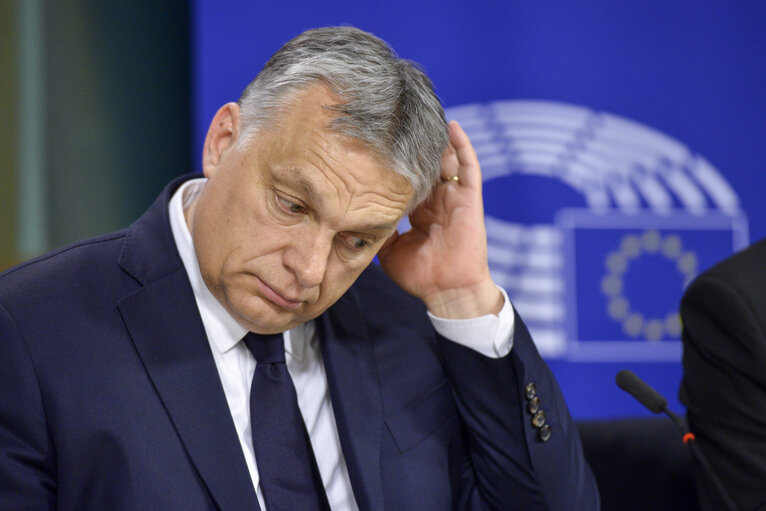EU member states are due to convene on 21 October for a hearing on Hungary’s compliance with the Union’s rule-of-law standards, in a session that could culminate in a vote to determine whether there is a “clear risk” of a serious breach of EU values under Article 7(1) of the Treaty on European Union.
Human Rights Watch urged governments to proceed to a vote, arguing that recent legislative and institutional developments in Hungary have intensified concerns over judicial independence, free expression and freedom of assembly.
Article 7 sets out a two-stage process: an initial, preventive finding under Article 7(1), which requires a four-fifths majority of member states, and a subsequent sanctions stage under Article 7(2), which can include suspension of voting rights and requires unanimity among member states, excluding the state concerned. The procedure against Hungary was launched by the European Parliament in 2018 and has since involved periodic hearings in the Council.
Rule-of-law scrutiny has sharpened in 2025. In March, Hungary adopted legislation that restricts freedom of assembly and bans public LGBT events, including Budapest Pride, by linking assembly rights to provisions of the 2021 law limiting the portrayal of LGBT content to minors. The European Parliamentary Research Service has noted the implications of the March measure for public events and the broader rights framework.
Parallel legal tracks are advancing at the EU Court of Justice. In June, the Court’s Advocate General recommended that the Court find Hungary’s 2021 law incompatible with EU law, citing infringements of non-discrimination, privacy and freedom of expression. A judgment is pending. Separately, proceedings concerning the 2023 Defence of National Sovereignty Act—which created the Sovereignty Protection Office (SPO)—have been placed on an expedited timetable.
The SPO’s remit and recent activity remain a focus for EU institutions and rights groups. Reporting through 2024–2025 documented concerns about the Office’s powers, including access to data and investigative authority over individuals and organisations deemed “foreign-influenced.” In March 2024, the Venice Commission recommended the repeal of provisions establishing the SPO; the European Commission opened infringement proceedings later that year. Media and civil society groups have reported investigations and public allegations by the Office against a range of organisations.
Financial conditionality continues to be used alongside legal action. As of mid-2025, approximately €18 billion in EU funds—combining cohesion allocations and recovery-facility disbursements—remained frozen pending compliance with rule-of-law and fundamental-rights conditions. Commission and parliamentary briefings through the summer indicated limited progress on several outstanding recommendations, and MEPs called in May for a full freeze of payments.
The Commission’s 2025 Rule of Law Report on Hungary highlighted ongoing issues in media pluralism, anti-corruption frameworks and safeguards around the judiciary, while also noting institutional changes since 2023. The report forms part of the evidentiary base that member states can draw on during Council deliberations.
Human Rights Watch has called on governments to couple any Article 7(1) determination with “concrete and time-bound” recommendations to Budapest, and to consider escalation to sanctions if benchmarks are not met. The organisation also flagged two additional matters likely to feature in member-state interventions: an imminent Court of Justice ruling on the 2021 law, and the Commission’s examination of Hungary’s June move to withdraw from the International Criminal Court, following ICC judges’ finding in July that Hungary failed to execute an arrest warrant when receiving Israel’s Prime Minister.
A decision to hold a vote on 21 October would mark a departure from previous Council practice, where hearings have not advanced to a formal determination under Article 7(1). Under the treaty, a four-fifths majority would allow the Council to issue a finding of risk and set compliance milestones. Should those not be met within a specified timeframe, member states could then consider moving to Article 7(2), where sanctions require unanimity.
Hungary’s government maintains that recent measures are aimed at protecting children and national sovereignty, and rejects allegations of systemic non-compliance. However, the combination of pending Court of Justice cases, continued conditionality-related fund suspensions, and the breadth of concerns raised by EU institutions and member states sets the context for next week’s hearing. The outcome will hinge on whether sufficient support exists to move from dialogue to a formal risk finding—and on the clarity and enforceability of any recommendations that accompany it.


